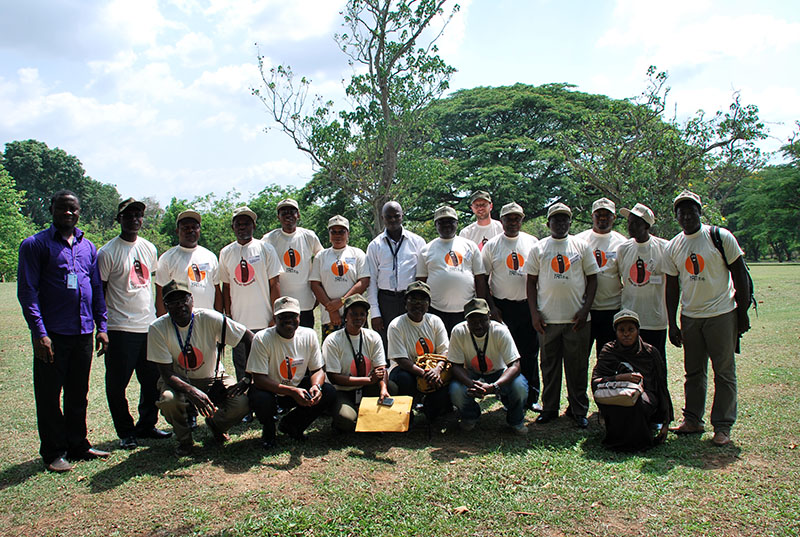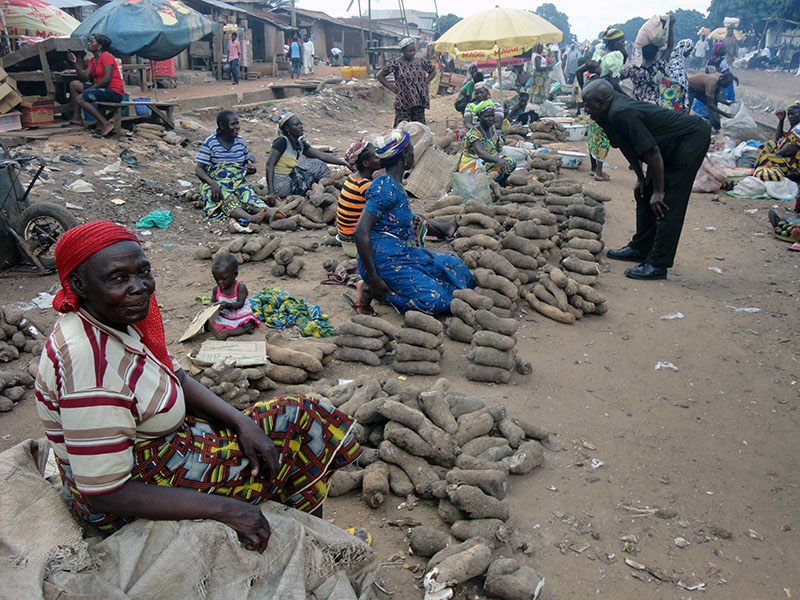
So said the t-shirts proudly worn by participants attending a three-day planning workshop (12-14 March 2013) in Ibadan, Nigeria for the Yam Improvement for Income and Food Security in West Africa (YIIFSWA) project. Now in its second year, the five-year $12m project funded by the Bill & Melinda Gates Foundation is led by International Institute of Tropical Agriculture (IITA).
Yam plays an important role in the food security, income generation and socio-cultural life of millions of people in West Africa. A number of constraints limit realisation of the full potential of the crop and thereby its contribution to the livelihoods of smallholder producers. The main objective of the YIIFSWA project is to increase yam productivity to improve income, livelihoods and food security of smallholder farmers in West Africa (specifically in Nigeria and Ghana).
The Natural Resources Institute (NRI) is contracted to lead and collaborate with partners on value chain analysis, business and market development programs and training, post-harvest practices and storage technologies, gender and social diversity, and yam virus diagnostics.
To date NRI has completed value chain analyses for Ghana and Nigeria, preliminary post-harvest and gender studies, facilitated the implementation of field surveys, and developed a training manual on clean seed yam management.
A central focus of the project is to develop and establish commercial production of seed yam. The intention is to improve the quality of seed, and thereby improve the quality of yam tubers in terms of product traits and resistance to pests and disease.
During the course of conducting value chain studies some private sector actors (e.g. seed companies and traders associations) have been identified and expressed interest in a commercial seed yam system. Work is on-going to engage these actors in the project.
Losses from storage are high (up to around 30%) and the yam tubers produced are often susceptible to disease. YIIFSWA's focus on improving quality of seed and increasing yields was reaffirmed by Dr Norbert Maroya (Project Manager) and Dr Robert Asiedu (Director, Research for Development, IITA West Africa) in their opening remarks at the workshop in Ibadan.
 NRI will collaborate with project partners from IITA, Farmer Organizations Support Centre in Africa (FOSCA) and others to conduct a number of yam working meetings. These working meetings will present, validate, and discuss findings from value chain, gender, post-harvest, and seed system studies, incorporating surveys of producer groups and service providers. They will aim to confirm capacity strengthening needs, investigate current seed yam systems in each location, and discuss ways forward regarding seed systems.
NRI will collaborate with project partners from IITA, Farmer Organizations Support Centre in Africa (FOSCA) and others to conduct a number of yam working meetings. These working meetings will present, validate, and discuss findings from value chain, gender, post-harvest, and seed system studies, incorporating surveys of producer groups and service providers. They will aim to confirm capacity strengthening needs, investigate current seed yam systems in each location, and discuss ways forward regarding seed systems.
A lot of positive momentum has been generated during the recent workshops to work collaboratively on significant activities over the coming months. For instance to initiate capacity building work in yam communities on improving production and marketing of yam, and more technical work to generate larger quantities of improved breeder and foundation seed yam. The foundation seed would then be multiplied on a commercial basis into large quantities of improved certified and quality declared seed yam. The objective is to provide 200 million improved seed yams (150 million in Nigeria and 50 million in Ghana) by the end of the project.
So we'll keep on yamming and we hope you like yamming too!
Project website: http://www.iita.org/web/yiifswa/home
PHOTO 1 - YIIFSWA project workshop participants wearing the 'yamming' T-Shirts from IITA
PHOTO 2 - Yam market by railtrack in Lafia, Nasarawa, Nigeria. Photo credit: David Phillips

